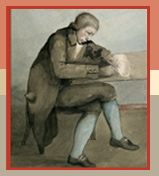
Iolo's People
Edward 'Celtic' Davies (1751-1831)
Evan Davies (Myfyr Morganwg, 1801-88)
Walter Davies (Gwallter Mechain, 1761–1849)
T C Evans (Cadrawd, 1846-1914)
Owen Jones (Owain Myfyr, 1741–1814)
Sir John Morris Jones (1864-1929)
William Owen Pughe (1759-1835)
William John Roberts (Gwilym Cowlyd, 1828-1904)
David Samwell (Dafydd Ddu Feddyg, 1751–98)
David Thomas (Dafydd Ddu Eryri, 1759–1822)
Griffith John Williams (1892-1963)
John Williams (Ab Ithel, 1811-62)
Lewis Morris (1701-1765)
Lewis Morris was a poet, scholar and cartographer. He was also a prolific letter-writer and, together with his brothers (Richard, William and, briefly, John), he was the driving force of the corresponding circle of the Morrises of Anglesey. Lewis, the oldest of the brothers, was born in the parish of Llanfihangel Tre'r-beirdd, Anglesey, and was raised in Pentre-eiriannell. In 1723 he worked as a land surveyor for Owen Meyrick of Bodorgan, Anglesey and in 1729 was employed as a searcher for its custom-house at Holyhead and Beaumaris, and then as collector of customs at Aberdyfi. In 1744 he was commissioned to survey the mineral wealth of Cwmwd Perfedd, and became the deputy-steward of Crown manors in Cardiganshire two years later. From 1746 until 1757 he lived at Galltfadog, and thereafter at Penbryn, Goginan. As a scholar he was interested in early Welsh history and literature. The Honourable Society of Cymmrodorion was the vision of his corresponding circle and he is considered one of the main promoters of the Celtic movement in the eighteenth century. He corresponded with the historian Thomas Carte and the antiquary Samuel Pegge, and in Welsh and English circles alike he was considered the foremost authority on the Welsh language and its early literature and antiquities. As a writer, one of his main aims was to provide a body of entertaining Welsh-language literature. To this end he published a selection of poetry and prose on his own press at Holyhead, Tlysau yr Hen Oesoedd (1735). Moreover, his letters and papers are replete with poems and prose writings that he wrote for the delectation of friends, according to English models by Jonathan Swift and Tom Brown. He also took it upon himself to act as poetic teacher to Goronwy Owen, Edward Richard, and Evan Evans, and a selection of his poems were published in Y Diddanwch Teuluaidd (1763).
Iolo never met Lewis Morris but he read the Morris papers at the Welsh Charity School at London and as a result Lewis Morris exerted a significant influence on Iolo's mindset and career. They both held the same patriotic attitude towards antiquarianism and other parallels between their careers appear. For example, Iolo also wrote poetry and in his proposed magazine, 'Dywenydd Morganwg', he tried to emulate what Lewis Morris had achieved in Y Diddanwch Teuluaidd. But Iolo became envious of the attention that Lewis Morris commanded, even after his death, and felt frustrated that his own authority on Welsh poetry and antiquities was not recognized - especially since he styled himself a direct descendant of the Druids! Iolo's hatred towards Lewis Morris was fired by stories that Evan Evans had related to him. In turn, this hatred became an important factor in the obvious tension between north and south Wales which characterizes Iolo's prejudice and bardic vision:
The late Lewis Morris had largely swallowed the North-Walian infatuation, and in some of his letters to Mr Edward Richards, insists upon it that N.Wales for ages had nothing in Poetry inferior to the Alliterative Poetry of the 24 metres, (See Camb. Regr. Vol II pp. 542, 544, &c) and that Song writing was a modern thing not much if any thing earlier than the time of Charles the II, such ignorance is astonishing, such a boast is just such another as for a nation to plume themselves on never having produced any thing in Poetry inferior to Acrostic, Anagram, Charade, Rebus, Enigma, &c, &c, for many of the 24 metres are still more ridiculous than any of the above kinds of poetry very often greatly admired by greatly vulgar minds, who neither see or feel anything of nature. This N.Walian boast is nothing less than a boast that they never (at least since the days of Gruffudd ap Cynan) had any natural and rational Poetry. National and local prejudices and infatutation blind the human mind as much, if not more than anything else. (LlGC 13138A, pp. 80-1)
See alsoLewis Morris's sarcasm on Cardiganshire

